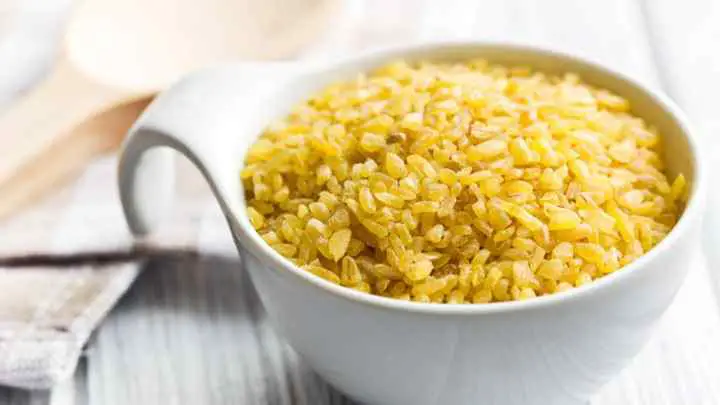Is bulgar gluten-free?
Bulgar is a quick-cooking Middle Eastern grain made from wheat berries. You can use it as a substitute for rice or pasta, in salads, soups, and stews, or as an ingredient in pilafs.
If you’re trying to avoid gluten, you may find yourself asking, is bulgar gluten-free? The short answer is no. Bulgar is made from wheat, and wheat contains gluten.
Read on to learn more about bulgar and why you should avoid it if you’re on a gluten-free diet.
What Is Bulgar?
Bulgar, also known as bulgur, is a type of cracked wheat that has been parboiled and dried. It’s a common ingredient in many cuisines, including Middle Eastern, Armenian, and Greek.
People often use bulgar as a substitute for rice or pasta, but you can use it just like any other grain in your cooking. It has a mild flavor that pairs well with other grains such as rice and oats or beans.
You can purchase bulgur at most health food stores, grocery stores, and farmers’ markets. You can also find it online through Amazon or other sites specializing in organic foods such as Lucky Vitamin or Vitamin shoppe.
SEE: Interesting Facts About Organic Foods That Will Surprise You
Is Bulgar Gluten-Free?
The answer is no. Bulgar is not gluten-free because it’s made from wheat berries that have been parboiled, dried, and then cracked into small pieces.
In general, most people with celiac disease or non-celiac gluten sensitivity will react to foods containing bulgar. If you’re uncertain about whether or not bulgur is safe for you to eat, talk to your doctor or dietitian before trying it.
Why Do You Need Bulgar in Your Diet?
Bulgur contains both insoluble and soluble fiber, which helps to improve bowel function and keeps your body healthy by speeding up digestion. Soluble fiber also helps lower cholesterol levels by binding with bile acids and removing them from the body before they can get to the liver.
Additionally, bulgar is an excellent source of protein (about 7 grams per half-cup serving). This means it’s an excellent choice if you’re looking to boost your muscle mass or lean body mass without adding too much body fat or calories to your diet.
Furthermore, bulgar is high in iron (which is essential for growth) and magnesium (which helps regulate blood pressure). It also contains B vitamins, making it an excellent food choice for anyone who needs to increase his or her daily vitamin intake.
SEE: Amazing Benefits of Gluten-Free Diets That Will Change Your Life
Gluten-Free Alternatives to Bulgar
Rice
Rice is a great gluten-free alternative to bulgar, especially if you want to make something like pilaf or rice salad. Brown rice has more fiber than white rice, but both will work just fine in your recipe if you’re looking for a gluten-free alternative to bulgur.
Quinoa
Quinoa is a gluten-free ancient grain that has become popular in recent years due to its high nutritional value and versatility. It has twice the protein content of most grains (including brown rice), and people often refer to it as “the Mother of All Grains.”
Quinoa also contains all nine essential amino acids, making it a complete protein source. Like bulgur, you can eat it alone, serve it in salads, or use it as an ingredient in many dishes.
Amaranth
Amaranth is another gluten-free ancient grain that was first cultivated by Native Americans long before Europeans developed corn. Like quinoa, amaranth contains all nine essential amino acids needed by humans.
It has a nutty taste and chewy texture similar to quinoa and bulgur, but it has more protein than both grains combined.
Teff
Teff is the smallest grain in the world and is native to Ethiopia, where it’s used as a staple food source. It’s also easy to digest due to its tiny size, which makes it ideal for people with digestive issues like irritable bowel syndrome (IBS) or Crohn’s disease.
SEE: List of Foods That Are Naturally Gluten-Free
Oats
Oats aren’t technically a “grain,” but they’re often used as an alternative to wheat products because they’re naturally gluten-free. You can use oats in place of bulgur in your favorite recipes that call for this ingredient.
Millet
Millet is a tiny type of grain that comes from several types of grasses. It’s gluten-free and has a nutty flavor similar to brown rice or oats. It also cooks quickly (in just 10 minutes) making it a great substitute for bulgur in salads or pilafs.
SEE: Is Better Than Bouillon Gluten-Free and a Good Choice for You – Cheffist
Corn
Corn is another gluten-free grain that you can add to any meal or snack as a side dish or topping. You can also use cornflour in baking recipes instead of wheat flour if you want to avoid gluten altogether.
Buckwheat groats
Buckwheat groats are a great substitute for bulgar because they have a similar taste, and they’re gluten-free. You can cook them up just like you would with bulgar, but they take longer to cook because they’re denser.
Chia seeds
Chia seeds are gluten-free and a good source of fiber, protein, and omega-3 fatty acids. They’re also easy to add to your diet; mix them into yogurt or oatmeal, sprinkle them over salads or eat them as is. You can even make chia seed pudding at home.
Sorghum
Sorghum is a gluten-free grain that has become more popular in recent years. People have cultivated it for more than 10,000 years and it’s available in many parts of the world.
Sorghum is a good source of protein and fiber and contains many vitamins and minerals. The grain can be used to make flour, syrup, or beer, and it works well in any recipe that calls for bulgar.
Arrowroot
Arrowroot is gluten-free, but it’s not an ingredient that many people are familiar with.
When you’re shopping for arrowroot, look for labels that say “100% arrowroot“ or “pure arrowroot.” These products will have no additives or fillers, making them an ideal choice for people with celiac disease and gluten sensitivity.
SEE: Get Free Food Coupon at Krispy Kreme
FAQs
Can you use bulgar as a substitute for rice?
Yes, you can. You can use bulgar as you would any other grain in recipes. Substitute it for rice or pasta to add some extra protein or fiber to your meal. You can also use it cold in salads or hot as a side dish or base for soups or stews.
Is bulgar good for weight loss?
Yes, it is. Bulgar is high in fiber and protein, which makes it an ideal choice for people who are trying to lose weight or are looking for ways to add more fiber to their diets.
Can you use bulgar in salads?
Yes, you can. Bulgar is a versatile ingredient that can be incorporated into many recipes. It’s great for making salads, soups, pilafs, or stuffings for meat dishes.
You can also use it as a substitute for pasta and other foods if you’re looking for a healthy way to add more whole grains to your diet.
Are oats gluten-free?
Yes, they are. Oats are naturally gluten-free and generally considered safe for people with celiac disease. However, there are some concerns about cross-contamination with wheat during processing.
If you’re sensitive to gluten, check with the manufacturer to make sure the oats you want to buy were not processed in facilities that also process wheat products.
Can celiacs digest gluten?
No, they can’t. Those with celiac disease have an autoimmune reaction to gluten, which means their immune systems mistakenly attack their bodies when they eat foods containing gluten.
This results in damage to the lining of the small intestine and prevents it from absorbing nutrients from food properly.
Conclusion
Bulgar is a delicious, gluten-containing, nutritious alternative to rice. It is a healthy grain that is high in fiber, protein, iron, and other essential nutrients.
If you’re sensitive to gluten or just don’t want it in your diet, it’s best to avoid this grain and go for gluten-free alternatives, such as quinoa and oats.
Thanks for reading.
If you’re looking for more information about gluten-free foods, check out Cheffist.






